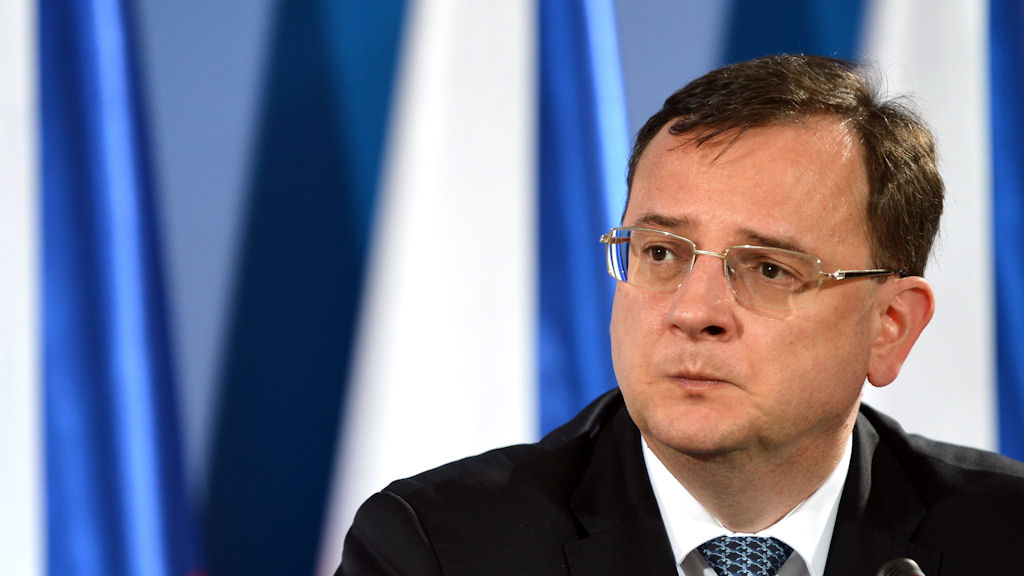Czech prime minister ‘Mr Clean’ resigns in graft scandal
He was once known as “Mr Clean” but now the Czech prime minister Petr Necas has been forced to step down after becoming embroiled in a corruption scandal involving spies, gold bars and his ex-wife.

Three years ago, Petr Necas became the prime minister of the Czech Republic on an anti-corruption ticket, earning himself the nickname “Mr Clean” from an electorate sick of sleaze.
Now he has stepped down amid a spy scandal, overnight raids and arrests of some of his closest advisers.
“I am fully aware of how the twists and turns of my personal life are burdening the Czech political scene,” said Mr Necas as he announced his intention to resign as prime minister and as leader of his party, the Civic Democratic party.
His ruling coalition will now try to form a new government, led by a different person, to rule until the elections scheduled for June next year. Mr Necas will stay on as a caretaker until a new government can be formed, as the country struggles to move beyond what leading newspaper Mlada Fronta Dnes called “a political scandal of the highest grade”.
I am fully aware of how the twists and turns of my personal life are burdening the Czech political scene. Prime Minister Petr Necas
Mr Necas’s resignation comes after his chief of staff Jana Nagyova was charged with abuse of power, bribing members of parliament and ordering military intelligence to spy on civilian targets – including, allegedly, Mr Necas’s own wife, Radka.
The pair announced last week that they are filing for divorce. Czech tabloids have long hinted at an affair between Mr Necas and Ms Nagyova, and the latest revelations have only fuelled the fire of rumour.
Ms Nagyova was arrested alongside a number of others – including two former MPs, an ex-minister and the current and former heads of military intelligence – after police raids on homes and offices which also uncovered 150 million Czech crowns (almost £5m) and large amounts of gold. Around 400 officers, some of whom were masked, were reportedly involved in the raids at more than 30 buildings.
Alongside the spying allegations, there are also claims that Ms Nagyova was involved in bribing rebellious politicians with offers of jobs at state-controlled firms in return for them giving up their seats.
As columnist Martin Fendrych put it to Czech television: “We have never seen this before. This is mad.”
Ms Nagova denies some of the charges against her and on the others says she acted in good faith. Mr Necas himself has denied any wrongdoing. However, the sheer scale of the scandal has finally sunk the prime minister in a country which often greets corruption scandals with a sigh and a shrug of the shoulders due to their regularity.
Corruption scandals
Corruption is considered to be endemic in the Czech Republic. Influential Prague businessmen and lobbyists are often called “godfathers” and Marianske Square – the location of Prague’s City Hall – is locally known as “Mafianske Square”. An unconventional tour company has recently made a success of offering so-called “graft” tours of the city – from the buildings where the alleged backroom deals were done to the luxury villas of “bent businessmen”.
Just last year, former health minister and governor of Central Bohemia David Rath was accused of embezzling EU money which was supposed to go towards renovating a hospital and castle in the Czech town of Bustehrad. He was detained carrying a wine case full of money, with more found stuffed down the floorboards of his home, and remains in custody. He denies the charges against him.
But in some ways, Mr Necas’s resignation is a ray of hope for citizens who are sick of graft in the top levels of government. If a scandal can topple a prime minister, many will hope it is a sign that, finally, there will be some comeback for those who bend the rules.
For Mr Necas himself however, there is a cruel irony at work. As “Mr Clean”, he was part of the government which implemented reforms giving police and prosecutors free rein to go after serious corruption cases, regardless of who might be involved. Now his own laws have seen his reputation dirtied by these allegations – and his new nickname is unlikely to be as flattering.
-
Latest news
-
As India goes to the polls in the world’s largest election – what do British-Indians think?6m

-
Tees Valley: Meet the candidates in one of the biggest contests coming up in May’s local elections4m

-
Keir Starmer says public sector reform will be a struggle7m

-
Nicola Sturgeon’s husband Peter Murrell charged with embezzlement of funds from SNP1m

-
Ukraine might finally get $60billion in American weapons and assistance to defend against Russia3m

-




